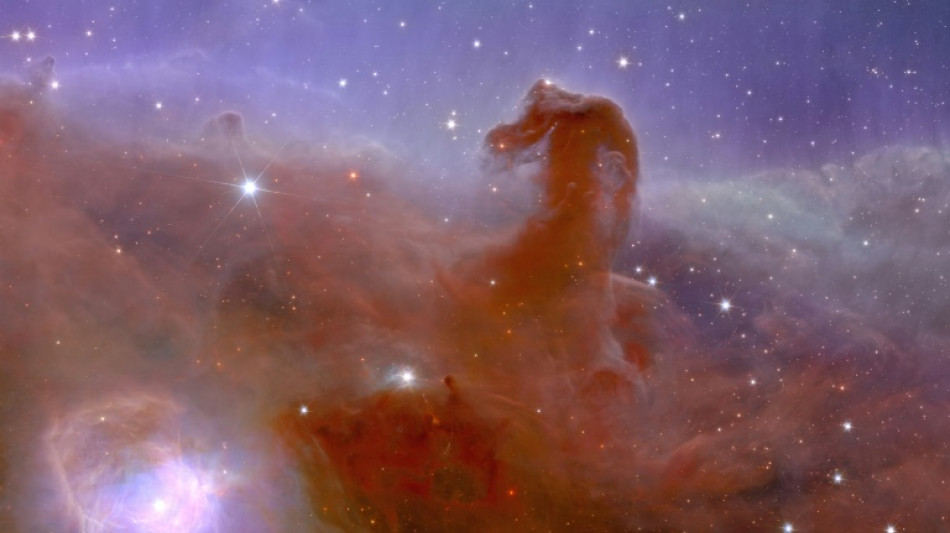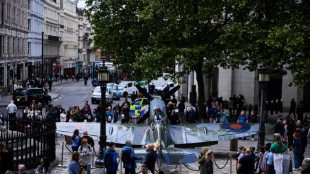
-
 Putin evokes WWII victory to rally Russia behind Ukraine offensive
Putin evokes WWII victory to rally Russia behind Ukraine offensive
-
China exports beat forecasts ahead of US tariff talks

-
 Leo XIV, the 'Latin Yankee', to celebrate first mass as pope
Leo XIV, the 'Latin Yankee', to celebrate first mass as pope
-
Most stocks lifted by hopes for US-China talks after UK deal

-
 IPL suspended indefinitely over India-Pakistan conflict: reports
IPL suspended indefinitely over India-Pakistan conflict: reports
-
German lender Commerzbank's profits jump as it fends off UniCredit

-
 Rare bone-eroding disease ruining lives in Kenya's poorest county
Rare bone-eroding disease ruining lives in Kenya's poorest county
-
India says repulsed fresh Pakistan attacks as de-escalation efforts grow

-
 Zhao's historic snooker title sparks talk of China world domination
Zhao's historic snooker title sparks talk of China world domination
-
'High expectations': EU looks to Merz for boost in tough times

-
 Poisoned guests rarely invited before deadly mushroom lunch, Australia trial hears
Poisoned guests rarely invited before deadly mushroom lunch, Australia trial hears
-
China sales to US slump even as exports beat forecasts

-
 Indian cricket to make 'final decision' on IPL over Pakistan conflict
Indian cricket to make 'final decision' on IPL over Pakistan conflict
-
Dethroned Bundesliga champions Leverkusen face uncertain future

-
 China can play hardball at looming trade talks with US: analysts
China can play hardball at looming trade talks with US: analysts
-
French monuments in trouble while PSG prepare for Champions League final

-
 Newcastle face Chelsea in top five showdown, Alexander-Arnold in spotlight
Newcastle face Chelsea in top five showdown, Alexander-Arnold in spotlight
-
Flick's Barca must show 'hunger' in crunch Liga Clasico

-
 Clasico the last chance saloon for Ancelotti's Real Madrid
Clasico the last chance saloon for Ancelotti's Real Madrid
-
Timberwolves overpower Warriors to level series

-
 Chinese fabric exporters anxious for US trade patch-up
Chinese fabric exporters anxious for US trade patch-up
-
Putin gears up to host world leaders at lavish army parade

-
 Nearing 100, Malaysian ex-PM Mahathir blasts 'old world' Trump
Nearing 100, Malaysian ex-PM Mahathir blasts 'old world' Trump
-
Leo XIV, first US pope, to celebrate first mass as pontiff

-
 Asian stocks lifted by hopes for US-China talks after UK deal
Asian stocks lifted by hopes for US-China talks after UK deal
-
Former head of crypto platform Celsius sentenced 12 years

-
 Ex-model testifies in NY court that Weinstein assaulted her at 16
Ex-model testifies in NY court that Weinstein assaulted her at 16
-
Genflow Biosciences PLC Announces Share Subscription, Director's Dealing and Update

-
 Argo Blockchain PLC Announces 2024 Annual Results and Restoration of Listing
Argo Blockchain PLC Announces 2024 Annual Results and Restoration of Listing
-
'Great honor': world leaders welcome first US pope

-
 Pacquiao to un-retire and fight Barrios for welterweight title: report
Pacquiao to un-retire and fight Barrios for welterweight title: report
-
Trump unveils UK trade deal, first since tariff blitz

-
 Man Utd one step away from Europa League glory despite horror season
Man Utd one step away from Europa League glory despite horror season
-
Jeeno shines on greens to grab LPGA lead at Liberty National

-
 Mitchell fires PGA career-low 61 to grab Truist lead
Mitchell fires PGA career-low 61 to grab Truist lead
-
AI tool uses selfies to predict biological age and cancer survival

-
 Extremely online new pope unafraid to talk politics
Extremely online new pope unafraid to talk politics
-
Postecoglou hits back as Spurs reach Europa League final

-
 Chelsea ease into Conference League final against Betis
Chelsea ease into Conference League final against Betis
-
Pope Leo XIV: Soft-spoken American spent decades amid poor in Peru

-
 First US pope shared articles critical of Trump, Vance
First US pope shared articles critical of Trump, Vance
-
'Inexcusable' - NBA champs Boston in trouble after letting big leads slip

-
 US automakers blast Trump's UK trade deal
US automakers blast Trump's UK trade deal
-
Stocks mostly rise as US-UK unveil trade deal

-
 Trump presses Russia for unconditional 30-day Ukraine ceasefire
Trump presses Russia for unconditional 30-day Ukraine ceasefire
-
Anything but Europa League glory 'means nothing' for Man Utd: Amorim

-
 'Inexcuseable' - NBA champs Boston in trouble after letting big leads slip
'Inexcuseable' - NBA champs Boston in trouble after letting big leads slip
-
Pope Leo 'fell in love with Peru'and ceviche: Peru bishop

-
 Pakistan's T20 cricket league moved to UAE over India conflict
Pakistan's T20 cricket league moved to UAE over India conflict
-
India tells X to block over 8,000 accounts


Europe's Euclid space telescope releases first images
The first images from Europe's Euclid space telescope were released on Tuesday, showing a nebula resembling a horse's head, never-before-seen distant galaxies and even "circumstantial evidence" of elusive dark matter.
Euclid blasted off in July on the world's first-ever mission aiming to investigate the enduring cosmic mysteries of dark matter and dark energy.
It will do so partly by charting one third of the sky -- encompassing a mind-boggling two billion galaxies -- to create what has been billed as the most accurate 3D map of the universe ever.
After joining fellow space telescope James Webb at a stable hovering spot around 1.5 million kilometres (more than 930,000 miles) from Earth, Euclid started sending back its first observations.
European Space Agency chief Josef Aschbacher said in a statement that Euclid's first five images were "awe-inspiring and remind us of why it is essential that we go to space to learn more about the mysteries of the universe".
They include an image of the Horsehead Nebula and part of the famous Orion constellation, as well as spiral and "irregular" galaxies.
But Euclid project scientist Rene Laureijs told AFP that the most exciting for the team was an image of the Perseus Cluster, a massive distant collection of more than a thousand galaxies.
Lurking in the background of the cluster is more than 100,000 additional galaxies, some of which are 10 billion light years away and have never been seen before, according to the ESA.
- 'Dark universe detective' -
Jean-Charles Cuillandre, another scientist working on Euclid, told AFP that Euclid is different to other space telescopes because it takes in a very wide field of view, "like never before seen in the history of astronomy."
In comparison, the Webb telescope "looks at the sky through the eye of a needle," he said.
This wide view means it can capture such broad images extremely quickly -- the five new images only took around eight hours of the telescope's time.
Images from another 16 hours -- making up a full day -- will be released in January.
The ESA has dubbed Euclid its "dark universe detective," charged with investigating why 95 percent of the universe appears to be made up of dark matter and dark energy, which we know very little about.
"Dark matter pulls galaxies together and causes them to spin more rapidly than visible matter alone can account for; dark energy is driving the accelerated expansion of the universe," explained ESA science director Carole Mundell.
Euclid's early images have already pointed towards "circumstantial evidence" of dark matter, according to Laureijs.
For example, he said it was "surprising" that Euclid did not spot stars trailing globular cluster NGC 6397, a collection of hundreds of thousands of stars.
"One of the theories is that there might be dark matter around the globular cluster, which keeps all the stars together," Laureijs said.
- Walk back in time -
By capturing light that has taken 10 billion years to reach Earth's vicinity, Euclid also hopes to better understand how dark energy has driven the universe's expansion since the Big Bang 13.8 billion years ago.
Once Euclid has collected enough data, the scientists plan to plot out a 3D map -- the third dimension being time.
Laureijs said the map would allow people to "walk through a part of the sky and go 10 billion years back in time".
But that will have to wait for future data releases over the planned six-year mission.
It has not been all smooth sailing for Euclid.
When the scientists first started their observations, they found that cosmic rays were disturbing the telescope's extremely sensitive fine guidance sensor.
The spacecraft's software had an algorithm that was "fooled" by the cosmic rays, Laureijs said.
However the team on the ground managed to upload a new algorithm to the spacecraft. "Now it works flawlessly," Laureijs said.
There was also a problem with sunlight reflecting off a thruster boom which required rotating the telescope a little, he added.
A series of scientific papers analysing what is in the five new images will be published soon, according to the ESA.
S.Gregor--AMWN


